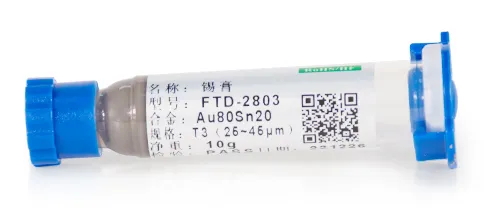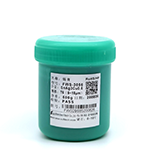Application of Gold-Tin Solder on Power LED Devices_Shenzhen Fitech

Application of Gold-Tin Solder on Power LED Devices
With the continuous development of LED technology, the luminous efficacy and brightness of LEDs have been improved, especially in the field of solid-state lighting, the market demand for high-power LEDs continues to grow. High-power LED devices have the advantages of high brightness, high efficiency, long life and environmental protection, but they also face challenges in heat dissipation and reliability. In order to solve these problems, gold-tin solder, as a high-performance brazing material, has become an ideal choice for encapsulating and connecting high-power LED devices due to its high strength, high thermal conductivity, and no need for flux. This article will introduce the physical properties of gold-tin solder, as well as its applications and advantages in high-power LED devices.
Currently, there are two main types of LED chip packages: wire-soldered (front-loaded) LEDs and flip-chip (FC) LEDs. Compared to wire-soldered LEDs, flip-chip LEDs have better heat dissipation, reliability, and soldering efficiency. Flip Chip LEDs, especially high power Flip Chip LEDs, are in line with the trend of LED packaging towards high density and low cost. Flip Chip LEDs are packaged with the light-emitting side of the LED chip facing down and bonded directly to the heat dissipation substrate, which shortens the heat conduction path, reduces the thermal resistance, and improves the heat dissipation efficiency. At the same time, due to the elimination of welding wires, it also reduces resistance and inductance and improves electrical performance. In addition, the package structure of flip chip LEDs is also more compact and stable, which is conducive to improving the optical performance and reliability of LEDs.

Figure 1. Solder-wire (front-loaded) LED (right) and Flip Chip (FC) LED package (left)
As the luminous efficiency of the LED chip is still low, most of the input power is converted into heat, resulting in an increase in the junction temperature of the chip. Junction temperature increase will not only reduce the luminous efficiency and stability of LED, but also accelerate the aging and failure of LED, affecting its life and reliability. Therefore, how to efficiently and rapidly export the heat generated by the chip to reduce the junction temperature is the key to high-power LED package design. Power LED devices face the following two main challenges when working:
(1) Heat dissipation. High-power LED devices will generate a large amount of heat when working, if it can not be effectively emitted in a timely manner, it will lead to an increase in the temperature of the device, thus affecting the device's light output, light color, stability and life. Therefore, the heat dissipation design of high-power LED devices is a key technical issue, need to consider the structure of the device, materials, packaging, connection and other aspects.
(2) Reliability issues. High-power LED devices will be subjected to high current, voltage, temperature, humidity, mechanical stress and other factors during operation, which may lead to aging, damage, failure and other phenomena, reducing the reliability of the device.
In order to solve these challenges, high-power LED device packaging interconnection technology plays an important role. The mechanical and electrical interconnections between the chip and the pad affect the heat dissipation and reliability of the device. Therefore, the selection of appropriate packaging and connection materials and methods is the key to improving the performance of high-power LED devices.
Gold tin solder is a binary intermetallic compound, generated by 80%wt Au and 20%wt Sn eutectic, melting point of 280 ℃, with the following advantages:
(1) High melting point. The melting point of gold-tin solder is 280 ℃, which is higher than the general soft brazing solder, and can maintain the strength and stability of the joints at higher temperatures. The melting point of gold-tin solder is also close to some commonly used electronic packaging materials, such as ceramics, tungsten-copper and so on, which makes the gold-tin solder can match well with these materials, avoiding the problems of thermal stress and thermal fatigue.
(2) High strength. The strength of gold-tin solder is higher than the general soft solder, its yield strength at room temperature can reach 47.5MPa, even at 250-260 ℃ high temperature, its strength can still meet some of the requirements of high-reliability electronic devices. The high strength of gold-tin solder makes it able to withstand greater mechanical stress and thermal shock, improving the reliability and durability of the joint.
(3) High thermal conductivity. Gold-tin solder thermal conductivity of 57W/m-k, in the soft brazing solder belongs to a higher level, so gold-tin solder can effectively conduct the heat out of the welding parts, reduce the temperature rise of the device, improve the thermal performance of the device. Especially for some high-power LED devices, gold tin solder can form a fast heat transfer channel, reducing the thermal resistance, improve the light efficiency and life.
(4) No flux. Gold-tin solder has good antioxidant performance due to its high gold content, its surface oxidation degree is low, so there is no need to use chemical flux in the soldering process.
Gold tin solder in the packaging of high-power LED chip is mainly used in chip bonding technology and chip-level packaging technology, its role is to connect the chip with the substrate or lead to form a solid joint, while the chip's heat conduction out to improve the chip's heat dissipation performance and reliability.

Figure 2. Au80Sn20 solder paste.
Shenzhen Fitech has professional experience in the development and production of solder paste, its gold-tin solder paste products with high tensile, corrosion resistance, excellent thermal creep performance, compatibility with other precious metals, excellent electrical conductivity, excellent thermal conductivity and so on a series of advantages, welcome to call us for advice.

















 Back to list
Back to list



